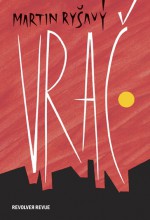Novelist, screenwriter, director of documentary films. Winner of the Josef Škvorecký Award (2011, in 2009 he was “only” nominated), two Magnesia Literas (2009 and 2011) and the Bank Austria Literaris award (2012). His books have also been brought out in German. He was born in Prague on 5 April 1967.
Martin Ryšavý

Forest Walkers
Lesní chodci
| Title | Publisher | Year | Selected published translations | Awards |
|---|---|---|---|---|
| Journeys to Siberia (Cesty na Sibiř) | Revolver revue | 2011 | ES |
2009 Magnesia Litera – Prose |
| Forest Walkers (Lesní chodci) | Revolver Revue | 2011 | ||
| Four-Column Island Station (Čtyřsloupový ostrov) | Revolver Revue | 2011 | ||
| Liar (Vrač) | Revolver Revue | 2010 | BG | DE |
2011 Magnesia Litera – Prose 2011 Josef Škvorecký Award |
| Journeys to Siberia (2) (Cesty na Sibiř (2)) | Revolver Revue | 2008 |
2009 Magnesia Litera – Prose |
|
| Journeys to Siberia (Cesty na Sibiř) | Revolver Revue | 2008 | ES |
2009 Magnesia Litera – Prose |
| Forest Walker (Lesní chodci. Kapesní sága) | Eva Babická | 2001 |

Forest Walkers
Lesní chodci

Four-Column Island Station
Čtyřsloupový ostrov

Forest Walker
Lesní chodci. Kapesní sága
| Award | Year | Country |
|---|---|---|
| Magnesia Litera – Prose | 2011 | Česká republika |
| Josef Škvorecký Award | 2011 | Tschechien |
| Magnesia Litera – Prose | 2009 | Česká republika |
Praise
Despite lengthy passages describing the local environment, Journeys to Siberia is primarily autotherapy. Deliberations on ethnographic, sociological and historical subjects are framed by the story of the main character and narrator, a man who is searching for himself.
—Petra Hůlová
iLiteratura
He graduated in biology and screenwriting. He started off writing scripts, first for his own film Argiš (Argish, 1995) about the life of a nomadic tribe on the icy Taymyr peninsula in the northernmost tip of Russia. He also wrote the screenplay for the chapter Cesta (Journey) in Vávra’s episodic film Co chytneš v žitě (In the Rye, 1998) and for the movie Lesní chodci (Forest Walkers, Ivan Vojnár, 2003). He later reworked this into a book – Lesní chodci with the subtitle Kapesní sága (A Pocket Saga, Eva Babická, 2001).
This was followed by a series of documentary films, mostly from Russian and its Siberian part: Sibiř – duše v muzeu (Siberia – Soul in a Museum, 2001), Afoňka už nechce pást soby (Afonka Doesn’t Want to Herd Reindeer Any More, 2004) and Malupien, Olšový Spas (2008). Ryšavý then put his experience and love of that harsh land into the two-volume novel Cesty na Sibiř (Journeys to Siberia, Revolver revue, 2008, 2011). For this he was awarded the Magnesia Litera for the best work of prose and was nominated for the Josef Škvorecký Award. As the writer Petra Hůlová states on iLiteratura.cz, “Despite lengthy passages describing the local environment, Cesty na Sibiř is primarily autotherapy. Deliberations on ethnographic, sociological and historical subjects are framed by the story of the main character and narrator, a man who is searching for himself.”
A novel about the absurdity of contemporary Russia entitled Vrač (Liar, Revolver revue, 2010) was awarded the Magnesia Litera for prose and the Josef Škvorecký Award. The main character is first a director, then a street sweeper and finally a dispatcher for Moscow’s municipal services. With its stratified monologue describing both present-day Moscow and the former Soviet Union, it takes in the “higher” world of art (through his role as a former director) as well as the “lower” world of street cleaners. The main character could just as easily be a documentary-maker as a liar, and the word “vrač” could just as easily mean a doctor as a charlatan. As Dora Kaprálová writes in the newspaper MFDnes, “Street sweeper Gučev, our vrač, who has lost everything except his gift of the gab and his sharp intellect, also knows that retreating into immobility and silence de facto equals death. Particularly in the reality of Putin’s Russia, contaminated by feudalism with elements of eternal communism and the worst offshoot of hard-line capitalism.” Vrač thus tells a story, constantly, with many digressions, yet in an engaging way.
Martin Ryšavý’s latest work is Stanice Čtyřsloupový ostrov (Four-Column Island Station, Revolver revue, 2011), in which he describes the subject matter of his earlier documentary Medvědí ostrovy (Bear Islands, 2010) about life at a Russian polar station. This is Russia as we imagine it – everybody drinks, so nothing works; nothing works, so everybody prefers to drink.




